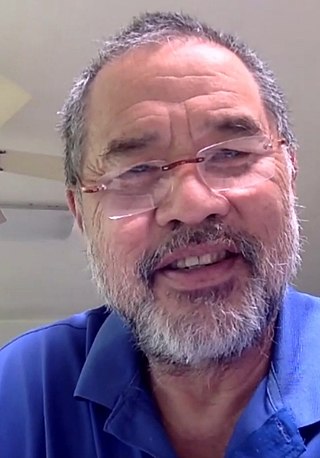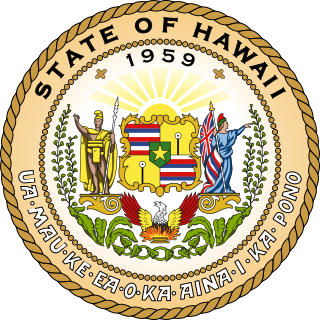Related Research Articles

The flag of Hawaii was first adopted in the early 19th century by the Hawaiian Kingdom and continued to be used after its overthrow in 1893. It is the only U.S. state flag to feature a foreign country's national flag—that of the Union Jack—which commemorates the British Royal Navy's historical relations with the Kingdom of Hawaii, and in particular the pro-British sentiment of its first ruler, King Kamehameha I.

John David Waiheʻe III is an American politician who served as the fourth governor of Hawaii from 1986 to 1994. He was the first American of Native Hawaiian descent to be elected to the office from any state of the United States. After his tenure in the governor's office, Waiheʻe became a nationally prominent attorney and lobbyist.

Neil Abercrombie is an American politician who served as the seventh governor of Hawaii from 2010 to 2014. He is a member of the Democratic Party.

Native Hawaiians are the Indigenous Polynesian people of the Hawaiian Islands.

The Hawaiian sovereignty movement is a grassroots political and cultural campaign to reestablish an autonomous or independent nation or kingdom of Hawaii out of a desire for sovereignty, self-determination, and self-governance.

Mililani Trask is a leader of the Hawaiian sovereignty movement, political speaker, and attorney. One of Trask's contributions to the Hawaiian sovereignty movement was her founding of Na Koa Ikaika o Ka Lāhui Hawaiʻi, a native Hawaiian non-governmental organization focusing on cultural, social, and economic development, education, health, housing, land entitlements, energy, and water issues.
The Office of Hawaiian Affairs (OHA) is a self-governing corporate body of the State of Hawaii created by the 1978 Hawaii State Constitutional Convention.

Muliufi Francis Hannemann is an American politician, businessman, and non-profit executive. He was elected twice as Mayor of Honolulu in 2004 and 2008. Hannemann has served as a special assistant in Washington, D.C., with the Department of the Interior, where he was selected for a White House fellowship in the Reagan administration under Vice President George H. W. Bush. He also served as chairman of the Honolulu City Council. He is the first person of Samoan descent and the second member of the Church of Jesus Christ of Latter-day Saints to serve as Mayor of Honolulu.

The Native Hawaiian Government Reorganization Act of 2009 S1011/HR2314 was a bill before the 111th Congress. It is commonly known as the Akaka Bill after Senator Daniel Akaka of Hawaii, who proposed various forms of this bill after 2000.

Clayton H. W. Hee is a former Democratic Party member of the Hawaii Senate who represented the 23rd District from 2004 to 2014 and 1984 to 1988. Hee served as chairman of the state senate's Judiciary and Labor Committee.
In 1898, the United States Congress annexed Hawaiʻi based on a Joint Resolution of Annexation. Questions about the legitimacy of the U.S. acquiring Hawaii through a joint resolution, rather than a treaty, were actively debated in Congress in 1898, and is the subject of ongoing debate. Upon annexation, the Republic of Hawai‘i transferred approximately 1.8 million acres of Hawaiian Government and Crown Lands to the United States (U.S.), which are today held by the State of Hawaiʻi. In the 1993 Apology Resolution, the U.S. government officially apologized to the Native Hawaiian people, acknowledging that the Republic of Hawaiʻi transferred these lands "without the consent of or any compensation to the Native Hawaiian people of Hawaiʻi or their sovereign government" and that "the indigenous Hawaiian people never directly relinquished their claims. .. over their national lands to the United States." Although the lands are commonly referred to as "ceded lands" or "public lands," some refer to them as "seized lands" or "Hawaiian national lands" or "crown lands" to highlight the illegal nature of the land transfer, acknowledge different interpretations of the legal effect of the Joint Resolution, and to recognize that Native Hawaiians maintain claims to these lands. Many Native Hawaiian individuals and organizations insist on the return of title, which would be consistent with international law and recognition of the rights of Indigenous peoples, whereas others seek back rent for the use of the land.

The politics of the U.S. state of Hawaii are typically dominated by the Democratic Party of Hawaii. The Democratic Party in Hawaii was formed in 1900, by supporters of Queen Liliʻuokalani. For the first half of the twentieth century, the Republican Party ruled comfortably, dominating local politics until the end of World War II. After the war, Honolulu police officer John A. Burns began organizing plantation laborers, including many Japanese Americans and Filipino Americans and built a coalition that gradually strengthened the Democratic Party in Hawaii. This culminated in the Hawaii Democratic Revolution of 1954, after which Republican political influence in the islands was greatly diminished.

Colleen Wakako Hanabusa is an American lawyer and politician who served as the U.S. representative for Hawaii's 1st congressional district from 2011 to 2015 and again from 2016 to 2019. A member of the Democratic Party, she ran for her party's nomination for governor of Hawaii in 2018, challenging and losing to incumbent and fellow Democrat David Ige.

The 2010 Hawaii gubernatorial election was held on November 2, 2010, to elect the next governor and lieutenant governor of Hawaii. Incumbent Republican governor Linda Lingle was term-limited and not eligible to run for re-election. The Democratic Party nominated Neil Abercrombie, and the Republican Party nominated incumbent lieutenant governor Duke Aiona. In the election, Abercrombie won and was sworn in as the state's 7th governor on December 6, 2010. Aiona later unsuccessfully ran for Governor of Hawaii in 2014 and 2022.
Mahealani Perez-Wendt is a Kanaka Maoli poet, writer and community activist residing in Hawaiʻi, on the island of Maui. She is the 1993 recipient of the Eliot Cades literary award, and is the author of Uluhaimalama and other publications. She recently retired as the executive director of Native Hawaiian Legal Corporation, a public-interest law firm specializing in Kanaka Maoli rights. She has worked for Native Hawaiian Legal Corporation since 1978.

Shan S. Tsutsui is an American politician who was the 13th lieutenant governor of Hawaii from 2012 to 2018. A member of the Democratic Party, he was previously a member of the Hawaii Senate from 2003 to 2012, and he served as President of the Senate from 2010 to 2012. On January 29, 2018, Tsutsui announced his resignation, which was put into effect on January 31.
Gilbert Kahele was an American politician and a Democratic member of the Hawaii Senate from January 16, 2011, representing District 1. He was appointed by Governor Neil Abercrombie to fill the vacancy caused by the appointment of Russell S. Kokubun as Hawaii Commissioner of Agriculture. Kahele died in office on January 26, 2016, after being hospitalized one week prior.

Emma ʻAʻima Aʻii Nāwahī was a Native Hawaiian political activist, community leader and newspaper publisher. She and her husband Joseph Nāwahī were leaders in the opposition to the overthrow of the Kingdom of Hawaiʻi and they co-founded Ke Aloha Aina, a Hawaiian language newspaper, which served as an important voice in the resistance to the annexation of Hawaiʻi to the United States. After annexation, she helped establish the Democratic Party of Hawaiʻi and became a supporter of the women's suffrage movement.

The 2022 Hawaii gubernatorial election took place on November 8, 2022, to elect the next governor of Hawaii. Incumbent Democratic governor David Ige was term-limited and ineligible to run for a third term. Incumbent lieutenant governor Josh Green was the Democratic nominee, and faced former lieutenant governor Duke Aiona, the Republican nominee. This marked the third time Aiona had been the Republican gubernatorial nominee, having previously run unsuccessfully in 2010 and 2014. Green won the election with 63.2% of the vote.
Linda Dela Cruz was a Native Hawaiian singer known as "Hawaii's Canary" and acclaimed for the Hawaiian "ha'i" (falsetto) style of singing. She was honored as an inductee of the Hawaiian Music Hall of Fame twice, once in 2006 as an individual and again in 2015 as part of the Halekulani Girls. After retiring from her musical career, Dela Cruz worked as an activist for Hawaiian rights and served on the board of trustees of the Office of Hawaiian Affairs.
References
- ↑ Bernardo, Rosemarie (July 21, 2012). "State launches Native Hawaiian registry: The yearlong effort seeks people eligible to help work toward self-governance,". Honolulu Star-Advertiser. Retrieved May 26, 2013.
- ↑ Reyes, B.J. (July 6, 2011). "New Law Gives Recognition to Native Hawaiians". Honolulu Star-Advertiser. Retrieved May 26, 2013.
- ↑ Blair, Chad (July 6, 2011). "'First Step' to a Native Hawaiian Governing Entity". Civil Beat. Retrieved May 15, 2013.
- ↑ Abercrombie, Neil. "Governor Enacts Bill To Further Self Determination For Native Hawaiians". Office of the Governor of the State of Hawai'i. Retrieved May 13, 2013.
- 1 2 Blair, Chad (July 6, 2011). "'First Step' to a Native Hawaiian Governing Entity". Honolulu Civil Beat. Retrieved May 15, 2013.
- ↑ Viotti, Vicki (August 9, 2004). "Hawaiian Program Gathering Speed". Honolulu Advertiser. Retrieved June 5, 2013.
- ↑ Roll Commission, Native Hawaiian. "How Does Kana'iolowalu Differ From Kau Inoa". 'Oiwi TV. Retrieved June 6, 2013.
- ↑ "Kau Inoa: To Build A Nation". Hawai'i Maoli. Retrieved June 6, 2013.
- ↑ Roll Commission, Native Hawaiian. "Reaching Hawaiians Outside of Hawai'i". 'Oiwi TV. Retrieved June 6, 2013.
- ↑ "OHA Pushes New Hawaiian Commission". Honolulu Star-Advertiser. Associated Press. August 4, 2011. Retrieved May 24, 2013.
- ↑ Staff, Star-Advertiser (September 8, 2011). "Native Hawaiian Roll Commission to be led by former Gov. Waihee". Honolulu Star-Advertiser. Retrieved May 19, 2013.
- ↑ Commission, Native Hawaiian Roll. "Report to Governor Abercrombie and the Hawaiʻi State Legislature" (PDF). Office of Hawaiian Affairs. Retrieved May 23, 2013.
- ↑ Staff, Star-Advertiser (January 6, 2012). "Former OHA Executive Oversees Native Hawaiian Roll Commission". Honolulu Star-Advertiser. Retrieved May 20, 2013.
- ↑ Catterall, Lee (January 22, 2012). "Hawaiians' Native Cause Is On A Roll: A new state law propels efforts to enlist Hawaiians, here and on the mainland, toward a convention to create a governing entity". Honolulu Star-Advertiser. Retrieved May 24, 2013.
- ↑ Bernardo, Rosemarie (July 20, 2012). "Campaign Launched To Create Roll of Native Hawaiians To Develop Governing Entity". Honolulu Star-Advertiser. Retrieved May 24, 2013.
- ↑ Native Hawaiian Roll Commission, Kanaiolowalu. "Kana'iolowalu – Maui". Akaku Maui Community TV. Retrieved June 4, 2013.
- ↑ "Kanaiolowalu and Credibility". Blogger. Retrieved June 11, 2013.
- ↑ Kanaiolowalu. "Home Page". Native Hawaiian Roll Commission. Retrieved August 2, 2013.
- ↑ Office of Hawaiian Affairs. "OHA to serve as facilitator in Hawaiian nation building" . Retrieved March 27, 2014.
- ↑ Lahaina News. "Hawaiians Urged to Participate in Kanaʻiolowalu Process" . Retrieved March 27, 2014.